Interior Angles of Polygons and explaination
Interior Angles of Polygons
An Interior Angle is an angle inside a shape

Another example:

Triangles
The Interior Angles of a Triangle add up to 180°
Let's try a triangle:
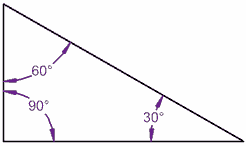
90° + 60° + 30° = 180°
It works for this triangle

90° + 60° + 30° = 180°
It works for this triangle
Now tilt a line by 10°:
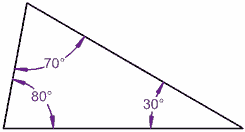
80° + 70° + 30° = 180°
It still works!
One angle went up by 10°,
and the other went down by 10°
Quadrilaterals (Squares, etc)
(A Quadrilateral has 4 straight sides)
Let's try a square:
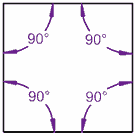
90° + 90° + 90° + 90° = 360°
A Square adds up to 360°

90° + 90° + 90° + 90° = 360°
A Square adds up to 360°
Now tilt a line by 10°:
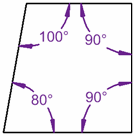
80° + 100° + 90° + 90° = 360°
It still adds up to 360°
The Interior Angles of a Quadrilateral add up to 360°
Because there are 2 triangles in a square ...
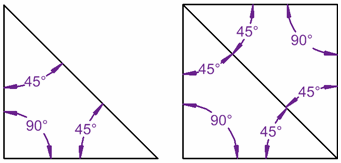
The interior angles in a triangle add up to 180° ...
... and for the square they add up to 360° ...
... because the square can be made from two triangles!
Pentagon
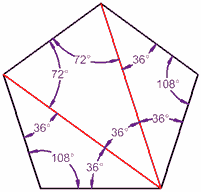
A pentagon has 5 sides, and can be made from three triangles, so you know what ...
... its interior angles add up to 3 × 180° = 540°
And when it is regular (all angles the same), then each angle is 540° / 5 = 108°
(Exercise: make sure each triangle here adds up to 180°, and check that the pentagon's interior angles add up to 540°)
The Interior Angles of a Pentagon add up to 540°
The General Rule
Each time we add a side (triangle to quadrilateral, quadrilateral to pentagon, etc), we add another 180° to the total:
| If it is a Regular Polygon (all sides are equal, all angles are equal) | ||||
| Shape | Sides | Sum of Interior Angles | Shape | Each Angle |
|---|---|---|---|---|
| Triangle | 3 | 180° |  | 60° |
| Quadrilateral | 4 | 360° |  | 90° |
| Pentagon | 5 | 540° |  | 108° |
| Hexagon | 6 | 720° |  | 120° |
| Heptagon (or Septagon) | 7 | 900° |  | 128.57...° |
| Octagon | 8 | 1080° |  | 135° |
| Nonagon | 9 | 1260° |  | 140° |
| ... | ... | .. | ... | ... |
| Any Polygon | n | (n-2) × 180° |  | (n-2) × 180° / n |
So the general rule is:
Sum of Interior Angles = (n-2) × 180°
Each Angle (of a Regular Polygon) = (n-2) × 180° / n
Perhaps an example will help:




